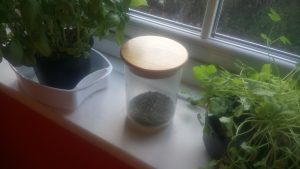


PEPPERMINT TEA FOR GERD
Peppermint tea for GERD (gastro-oesophageal reflux disease) is a commonly-tried method of symptom management. However, it is in fact strongly contra-indicated for this condition.
GERD, as it most commonly known, is a condition where contents from the stomach, notably acid, protrude up into the oesophagus. The mots noticeable symptoms are heartburn and acid regurgitation. There may also be damage to teeth through acid exposure, bad breath, chest pain, and even vomiting and breathing difficulties.
We all know that healthcare starts with ourselves, and the choices we make can have powerful impact upon some chronic and acute health conditions. However, there is a popular misconception about the supposed benefits of peppermint tea for GERD.
Peppermint has traditionally been used to aid digestion due to its antispasmodic properties and its ability to reduce build up of gas in the digestive system. This means that is has been used for thousands of years to address constipation, bloating, cramps, and diarrhoea.

Peppermint tea for GERD? Not such a good idea for this gastro-intestinal problem
However when it comes to drinking peppermint tea for GERD, as opposed to some other digestive issues, there is a problem. GERD occurs when the sphincter that separates the oesophagus from the stomach allows regurgitation of acid. Normally, substances flow in one direction only from the oesophagus into the stomach, but with GERD acid flows back up into the oesophagus. Peppermint tea is effective at relaxing the stomach muscles and thus aiding digestion, but it also relaxes the oesophageal sphincter, enabling further acid back up into the oesophagus. So it is, in fact, one of the worst things you can drink if you do suffer from GERD.
An alternative would be to try drinking chamomile mixed with meadowsweet. This is another traditional tea that has used been used for digestive issues. This combination has anti-inflammatory and anti-spasmodic properties and can help to relieve a wide variety of digestive issues. (While not strictly contra-indicated, some herbalists do caution against excessive use of chamomile in pregnancy. Meadowsweet certainly must be avoided during pregnancy and breast-feeding. As with all medicinal herbs, there may be other contra-indications that might apply to you, so it important to do a little research or to speak to a fully-trained herbalist before regular consumption. However, in the vast majority of cases, there should be no complication and hopefully great benefits.)
There are known risk factors associated with GERD, such as obesity, pregnancy, stress, smoking, and excessive consumption of alcohol or fat. So if you cannot look to peppermint tea for GERD symptom relief, as you might have hoped, you can try to address lifestyle matters, such as reducing stress levels, stopping smoking, cutting down on alcohol and fatty foods, and reducing weight if you are overweight.
Another very important tip is to avoid lying down within three hours of eating. This should help to reduce symptoms.
To find out more about GERD, please go to:
https://www.webmd.boots.com/heartburn-gord/guide/gastro-oesophageal-reflux-gord
If you think you suffer from digestive symptoms that may have a strong emotional component, you can find out more about acupuncture treatment and stress/anxiety at:


